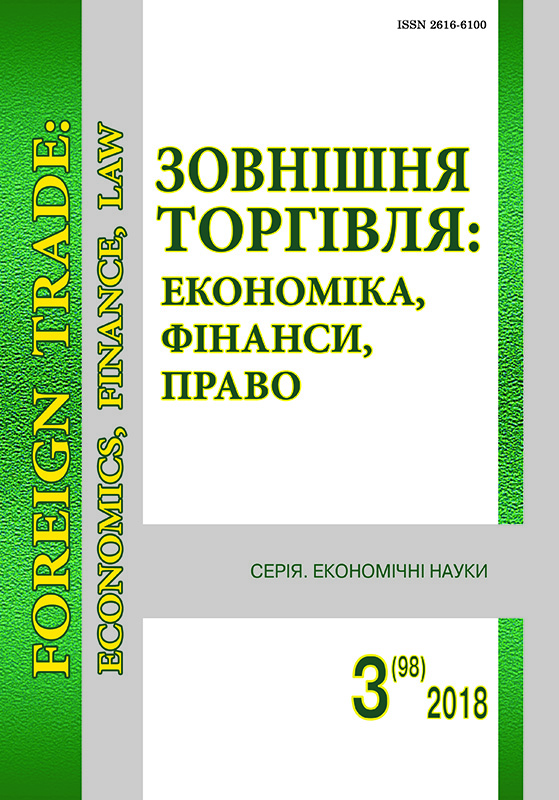Methodological bases of formation of financial policy of the country
Keywords:
state financial policy, fiscal policy, monetary policy, state financial strategy, institutes, economic development.Abstract
Background. The study of the problem of the formation of a country’s financial policy requires the use of a systematic approach in view of a certain separation of functions of state institutions. It is important to substantiate the conceptual provisions of the coordination of fiscal and monetary policy. When forming a strategy and operational measures of financial policy, the necessary condition is to adhere to a set of principles that determine the model of the relationship and the interaction of its structural elements.
Analysis of recent research and publications. Domestic and foreign scholars have thoroughly studied the methodological aspect of the development and role of monetary, the issues of the formation and implementation of the country’s fiscal policy, and the problems of improving the mechanism of development of state financial policy.
The issues of strengthening the coordination of fiscal and monetary policy, taking into account the strategic complementarity of their functional relationship, for the implementation of the above tasks remained insufficiently highlighted.
The aim of the article is to study and develop the methodological foundations for the formation of the state financial policy taking into account the level of economic development, institutional environment and cyclicality.
Materials and methods. The scientific works of domestic and foreign scientists on the problem under consideration are the theoretical and methodological basis of the research. The dialectical, systemic and structural approaches, methods of analysis and synthesis, comparison, generalization, scientific abstraction have been applied.
Results. The basic principles of forming a financial policy of a country with an emerging economy at the stage of development of its institutional structure are logical consistency, adaptability, alternativeness, systematic character, institutional certainty and neutrality. Their inclusion will increase the effectiveness of fiscal and monetary policy measures. The analysis of the structural components of the mechanism of formation of the main parameters of the financial policy of the country is carried out. The necessity of institutional transformation of the state’s economic doctrine is proved.
Conclusion. The state financial policy acts as the main mechanism of macroeconomic regulation. The high dynamism of social development causes the actualization of methodological principles for developing a set of measures to support sustainable economic growth and achieve financial stability. The impact of fiscal and monetary policy on the economy should be considered in an inseparable unity, taking into account regulatory interaction and the possibility of combining financial instruments with a view to achieving the goals and objectives. It is important to develop a long-term financial strategy that will foster the coordination of fiscal and monetary policies, optimize the volume of resources involved, and minimize the impact of the political cycle.
References
Arestis P. & Sawyer M. Can monetary policy affect the real economy? European Review of Economics and Finance. 2004. № 3 (3). Р. 3–26.
McCallum B. T. Issues in the design of monetary policy rules. Handbook of macroeconomics. 1999. Vol. 1. P. 1483–1530.
McCallum B. T. Targets, indicators, and instruments of monetary policy. National Bureau of Economic Research. 1989. № w3047. URL : ttps://core.ac.uk/download/pdf/6881270.pdf.
Mishhenko V. I., L'on I. M. Rol' monetarnogo reguljuvannja u stymuljuvanni ekonomichnogo rozvytku. Finansy Ukrai'ny. 2017. № 4. S. 75–93.
Friedman M. The role of monetary policy. The American economic review. 1968. № 58 (1). Р. 1–17.
Stein J. C. Monetary policy as financial stability regulation. The Quarterly Journal of Economics. 2012. № 127 (1). Р. 57–95.
Dem’janyshyn V. Teoretychni zasady bjudzhetnoi' polityky. Svit finansiv. 2007. № 1. S. 19–34.
Lysjak L. V. Bjudzhetna polityka u systemi derzhavnogo reguljuvannja social'noekonomichnogo rozvytku Ukrai'ny. Kyi'v : DNNU AFU, 2009. 594 s.
Ljutyj I. O. Teoretyko-metodologichni zasady bjudzhetnoi' polityky derzhavy. Finansy Ukrai'ny. 2009. № 12. S. 13–19.
Mjarkovs'kyj A., Chugunov I. Bjudzhetna polityka jak skladova social'no-ekonomichnogo rozvytku krai'ny. Visn. Kyi'v. nac. torg.-ekon. un-tu. 2010. № 5. S. 5–15.
Chugunov I. Teoretychni zasady rozvytku bjudzhetnyh vidnosyn. Visn. Kyi'v. nac. torg.-ekon. un-tu. 2011. № 4. S. 13–22.
Zapatrina I. Formuvannja finansovoi' polityky derzhavy: jevrointegracijnyj vymir. Visn. Kyi'v. nac. torg.-ekon. un-tu. 2012. № 2. S. 59–73.
Zymovec' V. Derzhavna finansova polityka ekonomichnogo rozvytku. Kyi'v : NAN Ukrai'ny ; In-t ekon. ta prognozuv., 2010. 355 s.
Lagutin V. Ekonomichna polityka derzhavy ta efekty i'i' realizacii'. Visn. Kyi'v. nac. torg.-ekon. un-tu. 2017. № 4. S. 5–20.
Lagutin V. Priorytety koordynacii' bjudzhetnoi' ta monetarnoi' polityky v Ukrai'ni. Finansy Ukrai'ny. 2011. № 10. S. 3–14.
Mazaraki A., Volosovych C. Dominanty instytucijnoi' modernizacii' finansovoi' systemy Ukrai'ny. Visn. Kyi'v. nac. torg.-ekon. un-tu. 2016. № 1. S. 5–23.
Dmitrieva O. Deformacija bjudzhetnoj politiki i upravlenija dolgom vsledstvie formirovanija stabilizacionnyh fondov. Voprosy jekonomiki. 2013. № 3. S. 20–32.
Konstytucija Ukrai'ny. 23 zhovt. 2017 r. Harkiv : Pravo, 2017. 63 s.
Pro Nacional'nyj bank Ukrai'ny : Zakon Ukrai'ny vid 20.05.1999 № 679-14. URL : http://zakon2.rada.gov.ua/laws/show/679-14.
Pro osnovni zasady groshovo-kredytnoi' polityky na 2018 rik ta seredn'ostrokovu perspektyvu : rishennja Rady Nacional'nogo banku Ukrai'ny vid 12.09.2017 № 37-rd. URL : http://zakon2.rada.gov.ua/laws/show/vr037500-17.
Arsahanova Z. A. Finansovaja politika jekonomicheskogo rosta: teorija i praktika. Moskva : Jekonomika, 2014. 416 s.
Fatas A. & Mihov I. Policy volatility, institutions, and economic growth. Review of Economics and Statistics. 2013. № 95 (2). Р. 362–376.
Rishel'e A.-Zh. dju Plessi. Politicheskoe zaveshhanie. Principy upravlenija gosudarstvom. M. : Ladomir, 2008. 500 s.
Ekonomichna encyklopedija : u 3 t. ; gol. red. B. D. Gavrylyshyn. T. 3 : P-Ja ; vidp. red. S. V. Mochernyj. Kyi'v : Akademija, 2002. 952 s.



